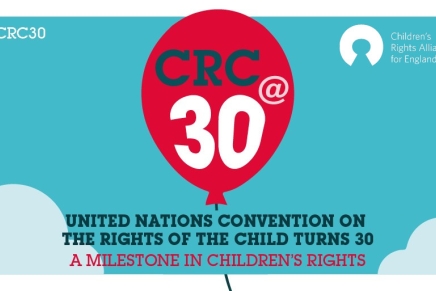Today is an important milestone in children’s human rights - the 30th anniversary of the UN Convention on the Rights of the Child (CRC). This important treaty, adopted by the UN in 1989, marked the first time that children all over the world were given their own set of binding human rights covering every area of their lives; from their right to be free from poverty and their right to education and play, to their right to be free from violence and have their views and opinions taken seriously.
When the UK ratified the treaty, it agreed to guarantee respect for children’s rights regardless of the changing political or economic climate. Over the coming years, the UK government took a number of positive steps to help ensure that this was the case in reality.
In 1998, the Human Rights Act became law, in 2003 a Children’s Minister was established, closely followed by a Children’s Commissioner whose mandate is to ensure all children’s rights are respected and promoted. Fast forward to 2019 and children’s rights are well on their way to being embedded across Whitehall with training for all civil servants and a Child Rights Impact Assessment template to help them assess the impact policies will have on children’s rights.
We have made far-reaching progress in many other areas. Take every child’s right to life and the highest attainable standard of health: by 1992 the rate of infant mortality halved from 1978 levels, while teenage pregnancy rates halved between 1998 and 2016, and the first child and adolescent mental health services (CAMHS) were established in 1998.
We have also made great strides in helping to protect and safeguard children from abuse, exploitation and violence. One of the first steps taken to ensure we complied with the Convention was the world-renowned piece of child protection legislation – the Children Act 1989.
In 1999, a step towards realising a children’s right to be protected from all forms of violence was taken when corporal punishment was outlawed in private schools (it had been outlawed in mainstream schools in the 1980s). A whole raft of legislation has also improved rights for children in care and care leavers and ensured better joint working between social workers and other child protection agencies.
The Convention is clear that all children, regardless of their immigration status, should have their rights respected so the UK’s removal of its general reservation to the CRC in 2008 which meant it didn’t apply to children in the immigration system was a big step in the right direction. Other key milestones over the years have included ending the immigration detention of children in 2010, a duty to consider children’s best interests and ensuring that age assessments are not a routine part of local authorities’ assessments of separated children.
Listening and respecting the views of children is a key principle of the Convention. In the last 30 years we have made many important steps to ensure children’s opinions are taken into account in decision-making: from the first youth parliament in 1998, to duties on Ofsted and local authorities to consider children’s views, wishes and feelings, as well as the right for all children in care and care leavers to have a statutory right to advocacy.
However, we still have a long way to go before the vision of childhood set out in the Convention is realised for all children. Children in the criminal justice system are some of the most vulnerable in society. Although, we have seen a huge drop in child arrests and the numbers of children in prison, we still lock up far too many children in unsuitable and unsafe places. An end to child imprisonment is long overdue. We would like to see a juvenile justice system which is child-centred, and the mandatory age of criminal responsibility raised significantly from the very young age of just 10 years as called for by numerous human rights bodies.
The Convention is clear that regardless of the economic climate, States should do whatever they can to ensure that children still have a standard of living which enables them to thrive. Unfortunately, children have been the hardest hit by recent austerity measures, with numbers of children in poverty and experiencing homeless at extraordinarily high levels. Child poverty and homelessness must be eradicated so all children can have a good childhood and grow up to reach their full potential.
Ultimately, the only way we will ensure the UK is able to fully implement the Convention and ensure all children’s rights are recognised is through full and direct incorporation of the CRC into our domestic law. It is hugely disappointing that, 30 years after it was adopted by the UN the CRC has still not been made part of UK domestic law. With a child rights duty on Welsh and Scottish Ministers and plans to incorporate the CRC in Scotland, England risks falling behind other countries in the UK in protecting the rights of children. Whichever party forms the next UK government, we look forward to working with them to ensure that all children in the country benefit from the rights they are entitled to.
Louise King is Director of Policy and Campaigns at Just for Kids Law and Director of the Children's Rights Alliance for England. This article was first published as a guest blog on CYP Now.
